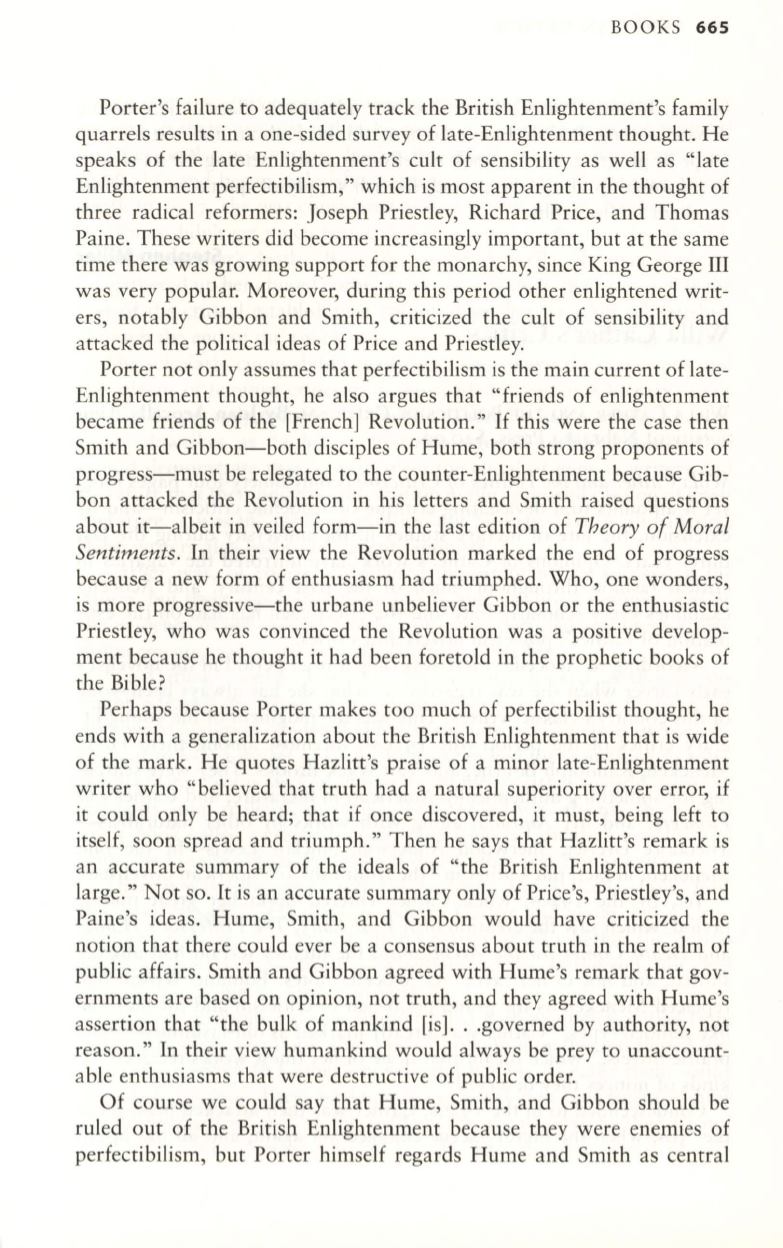
BOOKS
665
Porter's failure to adequately track the British Enlightenment's family
quarrels results in a one-sided survey of late-Enlightenment thought. He
speaks of the late Enlightenment's cult of sensibility as well as "late
Enlightenment perfectibilism," which is most apparent in the thought of
three radical reformers: Joseph Priestley, Richard Price, and Thomas
Paine. These writers did become increasingly important, but at the same
time there was growing support for the monarchy, since King George III
was very popular. Moreover, during this period other enlightened writ–
ers, notably Gibbon and Smith, criticized the cult of sensibility and
attacked the political ideas of Price and Priestley.
Porter not only assumes that perfectibilism is the main current of late–
Enlightenment thought, he also argues that "friends of enlightenment
became friends of the [French] Revolution."
If
this were the case then
Smith and Gibbon-both disciples of Hume, both strong proponents of
progress-must be relegated to the counter-Enlightenment because Gib–
bon attacked the Revolution in his letters and Smith raised questions
about it-albeit in veiled form-in the last edition of
Theory of Moral
Sentiments.
In their view the Revolution marked the end of progress
because a new form of enthusiasm had triumphed. Who, one wonders,
is more progressive-the urbane unbeliever Gibbon or the enthusiastic
Priestley, who was convinced the Revolution was a positive develop–
ment because he thought it had been foretold in the prophetic books of
the Bible?
Perhaps because Porter makes too much of perfectibilist thought, he
ends with a generalization about the British Enlightenment that is wide
of the mark. He quotes Hazlitt's praise of a minor late-Enlightenment
writer who "believed that truth had a natural superiority over error, if
it could only be heard; that if once discovered, it must, being left to
itself, soon spread and triumph." Then he says that Hazlitt's remark is
an accurate summary of the ideals of "the British Enlightenment at
large." Not so.
It
is an accurate summary only of Price's, Priestley's, and
Paine's ideas. Hume, Smith, and Gibbon would have criticized the
notion that there could ever be a consensus about truth in the realm of
public affairs. Smith and Gibbon agreed with Hume's remark that gov–
ernments are based on opinion, not truth, and they agreed with Hume's
assertion that "the bulk of mankind [is] ...governed by authority, not
reason." In their view humankind would always be prey
to
unaccount–
able enthusiasms that were destructive of public order.
Of course we could say that Hume, Smith, and Gibbon should be
ruled out of the British Enlightenment because they were enemies of
perfectibilism, but Porter himself regards Hume and Smith as central


